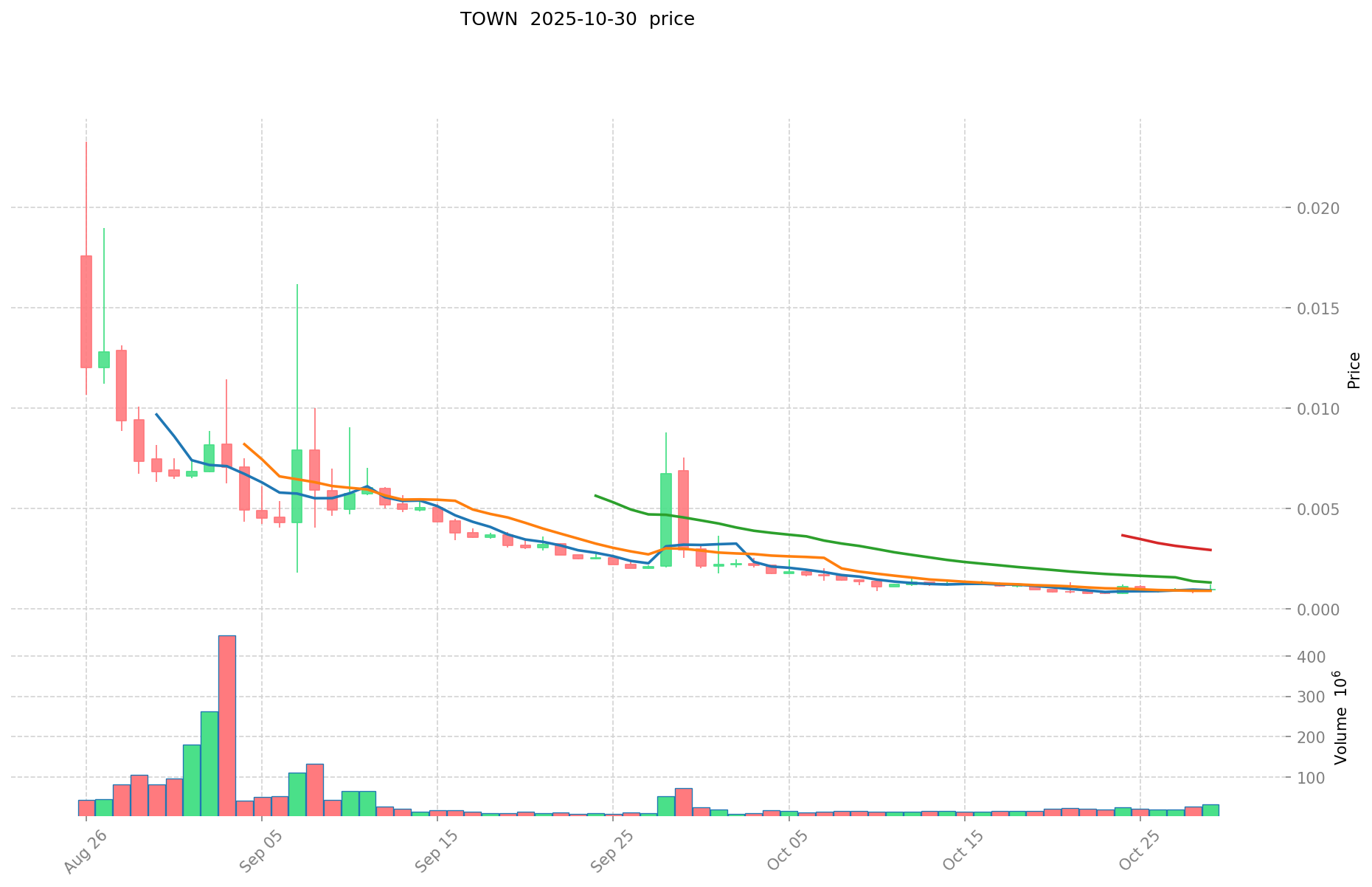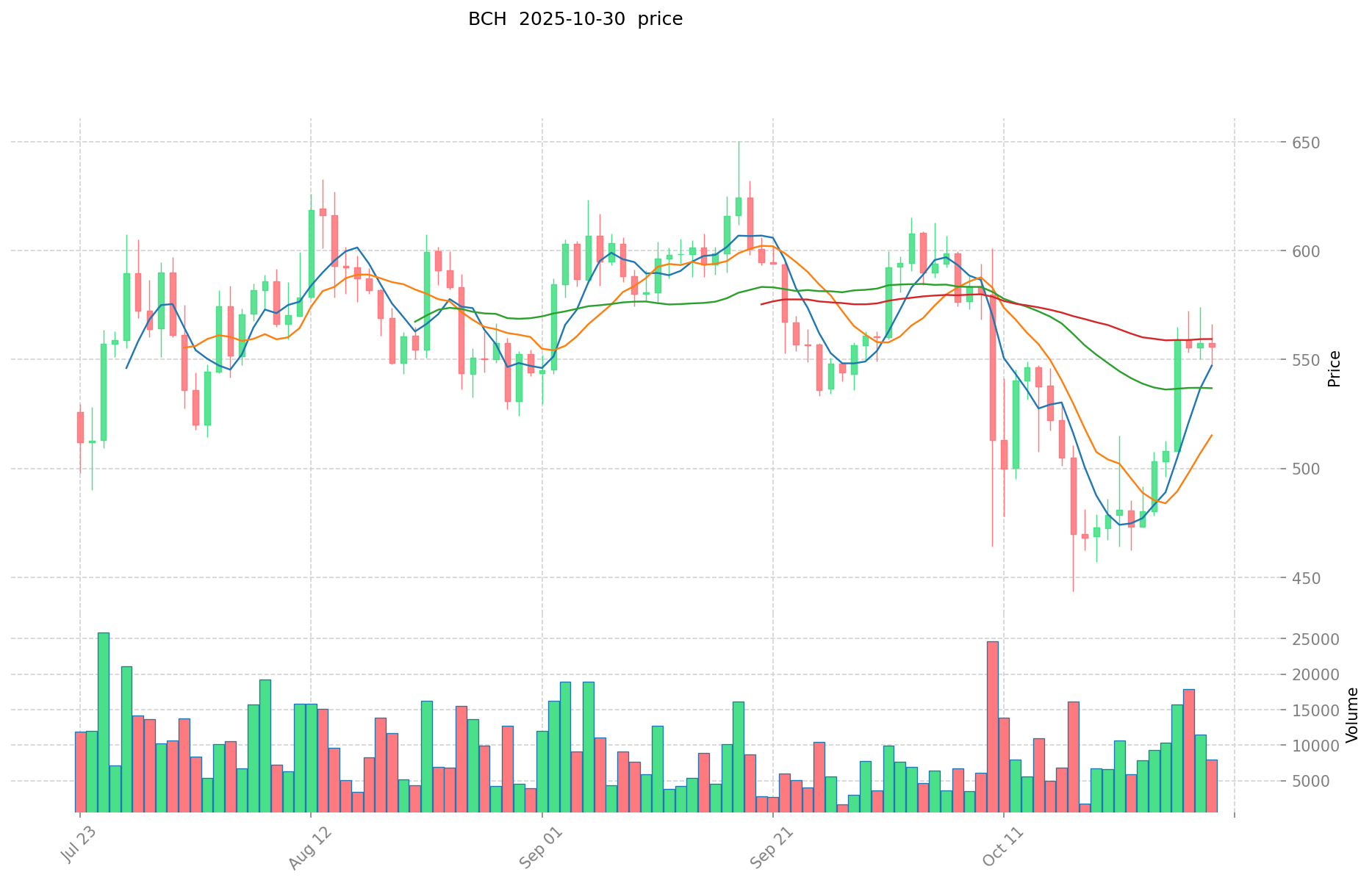TOWN vs BCH: Clash of the Crypto Titans in the Digital Currency Arena
Introduction: TOWN vs BCH Investment Comparison
In the cryptocurrency market, the comparison between Alt.town (TOWN) vs Bitcoin Cash (BCH) remains an unavoidable topic for investors. The two not only differ significantly in market cap ranking, application scenarios, and price performance but also represent different positioning in the crypto asset space.
Alt.town (TOWN): Launched in 2025, it has gained market recognition for its focus on the value growth of virtual celebrities in the Web3 era.
Bitcoin Cash (BCH): Since its inception in 2017, it has been hailed as a "peer-to-peer electronic cash system," and is one of the most widely traded cryptocurrencies globally by market capitalization.
This article will provide a comprehensive analysis of the investment value comparison between TOWN and BCH, focusing on historical price trends, supply mechanisms, institutional adoption, technological ecosystems, and future predictions, attempting to answer the question most crucial to investors:
"Which is the better buy right now?" I. Price History Comparison and Current Market Status
TOWN (Coin A) and BCH (Coin B) Historical Price Trends
- 2025: TOWN reached its all-time high of $0.0233 on August 26.
- 2017: BCH was created through a Bitcoin hard fork, with an initial price of $555.89.
- Comparative analysis: In the recent market cycle, TOWN dropped from its high of $0.0233 to a low of $0.0007133, while BCH has shown more stability, currently trading at $540.76.
Current Market Situation (2025-10-30)
- TOWN current price: $0.0009566
- BCH current price: $540.76
- 24-hour trading volume: TOWN $21,046.11 vs BCH $8,053,671.71
- Market sentiment index (Fear & Greed Index): 34 (Fear)
Click to view real-time prices:
- View TOWN current price Market Price
- View BCH current price Market Price


Bitcoin Cash (BCH) Investment Value Analysis
I. Core Factors Affecting BCH Investment Value
Transaction Efficiency and Cost
- Block Size: BCH increased block size from Bitcoin's 1MB to 8MB, and later to 32MB
- Transaction Speed: Faster processing capabilities during network congestion
- Low Fees: Significantly reduced transaction costs compared to Bitcoin
- Daily Payment Utility: Positions as "electronic cash" for everyday small transactions
Technical Innovation and Community Support
- Smart Contracts: Implemented in 2021, expanding beyond payment functionality
- Developer Interest: Attracts attention from developers and businesses
- Community Activity: Strong community provides ongoing development momentum
- Continuous Network Upgrades: Regular improvements to maintain competitiveness
Market Performance and Competition
- Price History: Experienced significant volatility (reached nearly $4,000 in 2017)
- Competitive Landscape: Faces competition from other cryptocurrencies (ETH, LTC)
- Market Recognition: Positioning as "circulating currency" vs Bitcoin's "store of value"
- Adoption Rate: Acceptance by merchants and payment platforms
Macroeconomic Influences
- Economic Uncertainty: Global economic shifts affect investment behavior
- Regulatory Environment: Policy changes impact cryptocurrency valuation
- Market Sentiment: Investor confidence affects price stability
- Risk Hedging: Potential diversification asset during traditional market volatility
II. BCH Use Cases and Applications
Payment Solutions
- Daily Transactions: Suitable for shopping, dining, and online payments
- Cross-Border Transfers: Lower costs and faster settlement than traditional banking
- Micro-Payments: Ideal for gaming, content creator tipping, and streaming platforms
- Financial Technology Integration: Incorporated into online payment processes and mobile wallets
Investment Considerations
- Portfolio Diversification: Used to hedge against traditional financial market uncertainty
- Trading Opportunities: Available on major exchanges for spot and derivative trading
- Asset Conversion: Used to exchange for other crypto assets
- Price Dynamics: Follows supply-demand economics with limited circulation supply
III. Price Influencing Factors
Technical Events
- Hard Forks: Network splits can create uncertainty or opportunity
- Protocol Upgrades: Improvements may positively impact market confidence
- Infrastructure Development: Support for decentralized applications (DApps)
External Factors
- Traditional Market Volatility: Affects fund allocation between traditional and crypto assets
- Exchange Listings: Addition or removal from major exchanges impacts tradability
- Global Events: Financial crises, geopolitical tensions, and natural disasters influence market risk preference
III. 2025-2030 Price Prediction: TOWN vs BCH
Short-term Prediction (2025)
- TOWN: Conservative $0.000894621 - $0.0009831 | Optimistic $0.0009831 - $0.001346847
- BCH: Conservative $286.0622 - $539.74 | Optimistic $539.74 - $707.0594
Mid-term Prediction (2027)
- TOWN may enter a growth phase, with an estimated price range of $0.00118419556275 - $0.0017949911688
- BCH may enter a consolidation phase, with an estimated price range of $505.70183664 - $719.65261368
- Key drivers: Institutional fund inflows, ETFs, ecosystem development
Long-term Prediction (2030)
- TOWN: Base scenario $0.001848403374766 - $0.001903855476009 | Optimistic scenario $0.001903855476009
- BCH: Base scenario $878.522087338896 - $1036.65606305989728 | Optimistic scenario $1036.65606305989728
Disclaimer: The above predictions are based on historical data and market analysis. Cryptocurrency markets are highly volatile and subject to rapid changes. These predictions should not be considered as financial advice. Always conduct your own research before making investment decisions.
TOWN:
| 年份 | 预测最高价 | 预测平均价格 | 预测最低价 | 涨跌幅 |
|---|---|---|---|---|
| 2025 | 0.001346847 | 0.0009831 | 0.000894621 | 2 |
| 2026 | 0.00132806979 | 0.0011649735 | 0.00060578622 | 21 |
| 2027 | 0.0017949911688 | 0.001246521645 | 0.00118419556275 | 30 |
| 2028 | 0.001855322816418 | 0.0015207564069 | 0.001140567305175 | 58 |
| 2029 | 0.002008767137874 | 0.001688039611659 | 0.001451714066026 | 76 |
| 2030 | 0.001903855476009 | 0.001848403374766 | 0.001441754632317 | 93 |
BCH:
| 年份 | 预测最高价 | 预测平均价格 | 预测最低价 | 涨跌幅 |
|---|---|---|---|---|
| 2025 | 707.0594 | 539.74 | 286.0622 | 0 |
| 2026 | 673.271676 | 623.3997 | 330.401841 | 15 |
| 2027 | 719.65261368 | 648.335688 | 505.70183664 | 19 |
| 2028 | 1005.4714017348 | 683.99415084 | 396.7166074872 | 26 |
| 2029 | 912.311398390392 | 844.7327762874 | 447.708371432322 | 56 |
| 2030 | 1036.65606305989728 | 878.522087338896 | 509.54281065655968 | 62 |
IV. Investment Strategy Comparison: TOWN vs BCH
Long-term vs Short-term Investment Strategies
- TOWN: Suitable for investors focused on Web3 and virtual celebrity ecosystems
- BCH: Suitable for investors seeking established networks with payment utility
Risk Management and Asset Allocation
- Conservative investors: TOWN: 10% vs BCH: 90%
- Aggressive investors: TOWN: 30% vs BCH: 70%
- Hedging tools: Stablecoin allocation, options, cross-currency portfolios
V. Potential Risk Comparison
Market Risks
- TOWN: Higher volatility, less liquidity, and market recognition
- BCH: Competition from other cryptocurrencies, market sentiment shifts
Technical Risks
- TOWN: Scalability, network stability
- BCH: Mining centralization, potential security vulnerabilities
Regulatory Risks
- Global regulatory policies may impact both, with BCH potentially facing more scrutiny due to its wider adoption
VI. Conclusion: Which Is the Better Buy?
📌 Investment Value Summary:
- TOWN advantages: Focus on emerging Web3 trends, potential for high growth
- BCH advantages: Established network, wider adoption, proven track record
✅ Investment Advice:
- New investors: Consider a small allocation to BCH for exposure to established cryptocurrencies
- Experienced investors: Balanced portfolio with both TOWN and BCH, adjusting based on risk tolerance
- Institutional investors: Primarily BCH for liquidity and market recognition, with a smaller allocation to TOWN for potential growth
⚠️ Risk Warning: Cryptocurrency markets are highly volatile. This article does not constitute investment advice. None
VII. FAQ
Q1: What are the key differences between TOWN and BCH? A: TOWN focuses on Web3 and virtual celebrity ecosystems, while BCH positions itself as a "peer-to-peer electronic cash system." TOWN is newer and more volatile, while BCH has a longer history and wider adoption.
Q2: Which coin has better short-term investment potential? A: Based on current market trends, BCH may offer more stability in the short term due to its established network and wider adoption. However, TOWN could potentially offer higher returns but with increased risk.
Q3: How do the long-term price predictions compare for TOWN and BCH? A: By 2030, TOWN is predicted to reach $0.001903855476009 in an optimistic scenario, while BCH is predicted to reach $1036.65606305989728. BCH shows higher absolute values, but TOWN may offer higher percentage gains from its current price.
Q4: What are the main risk factors for investing in TOWN and BCH? A: For TOWN, the main risks include high volatility, low liquidity, and potential scalability issues. For BCH, risks include competition from other cryptocurrencies, mining centralization, and potential regulatory scrutiny.
Q5: How should investors allocate their portfolio between TOWN and BCH? A: Conservative investors might consider allocating 10% to TOWN and 90% to BCH, while more aggressive investors could opt for a 30% TOWN and 70% BCH split. The exact allocation should be based on individual risk tolerance and investment goals.
Q6: What are the primary use cases for BCH? A: BCH is primarily used for daily transactions, cross-border transfers, micro-payments, and as a potential hedge against traditional market volatility. It's also integrated into various financial technology solutions.
Q7: How do external factors affect the prices of TOWN and BCH? A: Both coins are influenced by factors such as global economic conditions, regulatory changes, market sentiment, and technological advancements in the crypto space. BCH may be more sensitive to changes in the broader cryptocurrency market due to its larger market cap.
Share
Content